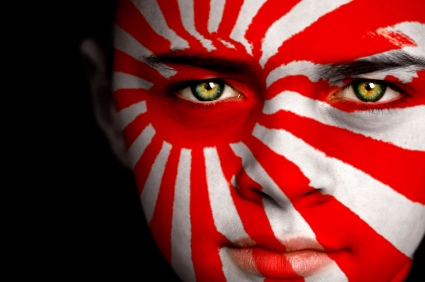
Yes, Astro Boy was originally a manga in the 1960's. Manga unofficially began in the 17th century as a satire rich commentary on Japanese Buddhist priests, similar to contemporary Western political cartoons. It is now a Japanese favorite for all kinds of storytelling. There are the most famous mangas about martial arts and super powered, ki wielding warriors, but there are also works on European fairy tales, and I have found many based on Shakespeare's plays. Besides using the typical tools to judge whether any other piece of literature is good, I decided to include personal points that I have found make manga worth reading. Please note that not all genre's of manga fit each of the items on my list.
(I was going to put a very violent scene from a 1960's comic of a samurai successfully decapitating a foe, but I remembered where I go to school)
1. Productive Violence
Japan as a nation is famous (and infamous) for the value it's citizens place on honor, especially on the battlefield. Violence started appearing in mangas in the 60's. This insertion proved popular among the buyers, therefore most of the key figures of manga's development jumped on board. However, this aspect of manga, in my opinion, has overtaken the art. Much of the violence does not help with the story telling and feels forced in many works. Therefore, PRODUCTIVE violence is key. Pointless violence just serves as visual candy with a poisonous after taste, especially splatter scenes.

2. Lifts the Spirit of Children
I mention children in particular because of an important piece in Japanese history. The developing manga franchise written post World War II was specifically aimed at helping Japanese children cope with their new world. One year, their leaders insist that the Japanese are going to take over the world. The next year, there is little of Japan left. The writers' intended to write comic strips that would offer a break from this world of desolation. I believe this has much to do with the modern day success manga has achieved. So, if the manga is appropriate for a twelve year old and helps the said twelve year old forget about his or her dreary and teenage angst-filled life for at least half an hour, I'd say you have a winner.
3. Educates
By "educates" I am not saying that good manga is sickeningly didactic or preachy, nor does it need to be a text book (although there are some mangas that teach physics and chemistry). Codes of honor and proper family relationships are often explored in modern day mangas. This is an obvious selling point for Japanese writers, because the culture is so concerned with these topics. A main character need not make a right choice, nor should he be punished for a wrong choice regarding honor and family. Just having the situation arise helps educate readers a bit by forcing them to think what they would do in the main character's position. Also, many have seen what the powerful images manga creates can do to a child's attention span. One of the websites I constantly suggest has lesson plans that include teaching the classic plays using the animations to help keep the kids focused. Therefore, there is no official "right" way to educate, but there are a bunch of wrong ones.

What Does This Have to do With Shakespeare or my Learning Plan?
Well, I'll tell you exactly what this has to do with Shakespeare and my learning plan. First, one of my goals for this blog is to see where Shakespeare fits into modern day society, and manga is a modern art form that he seems to fit into. I also want to include many of the manga interpretations of the plays in my media prep and having a knowledge of the basics will help me understand where the writers are coming from. Finally, since I could not find a good resource to judge the quality of the mangas or anime I find, I wanted to learn enough about the craft to be my own judge. So there. Now I get to prepare for Saturday's Sonnet and King Richard III.
Bibliography
Japanese Visual Culture : Explorations in the World of Manga and Anime [0-7656-1601-7] Macwilliams yr:2008.
